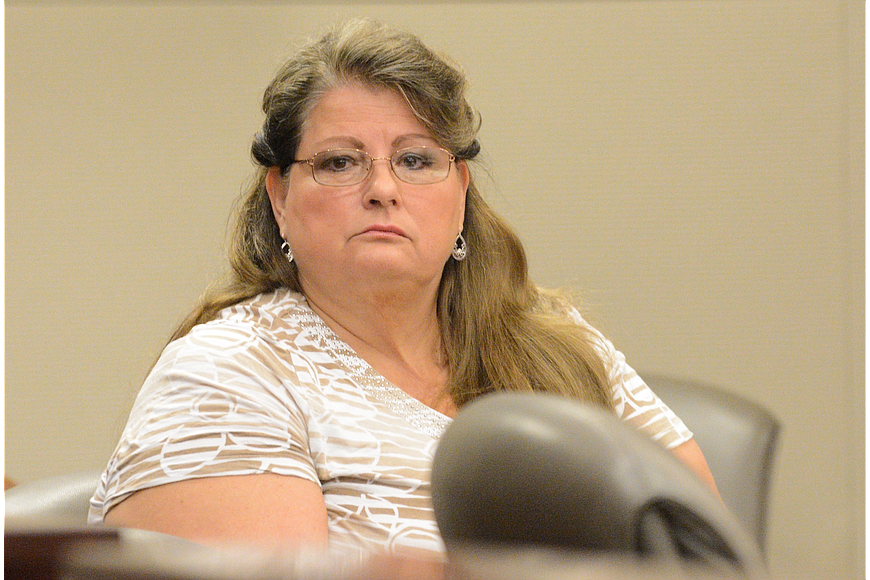- April 19, 2024
-
-
Loading

Loading

Former Flagler County elections supervisor Kimberle Weeks initially faced 12 felony counts on charges of surreptitiously recording other people's conversations and then disseminating those recordings. Those 12 charges have now been whittled down to just five.
After a series of pretrial hearings, Circuit Judge Margaret Hudson threw out four counts against Weeks March 31, among them the one that prompted the investigation: the allegation that Weeks had surreptitiously recorded a conversation between County Attorney Al Hadeed and County Commissioner Charlie Ericksen.
But Hudson also denied the defense's motion to suppress a search warrant that led the prosecution to much of its physical evidence, including a computer and cell phone which held recordings Weeks had made surreptitiously. The prosecution will therefore be allowed to use that evidence, which is crucial to its case, when Weeks' trial begins. (See Hudson's order on the search warrant HERE.)
Hudson had previously thrown out three of the original 12 counts. Weeks' attorneys had sought to have all of the charges against Weeks dismissed.
For each of the counts that she dismissed March 31, Hudson found that the individuals that Weeks had recorded did not have a reasonable expectation of privacy. (See Hudson's full order on the charges HERE.)
In the case of Weeks' recording of a whispered conversation between Hadeed and Ericksen, the recording took place in the context of a Canvassing Board meeting, when the two men stayed behind in one room while the rest of the Canvassing Board had moved to another. Weeks had left her cellphone out on the table in room the two men were speaking in, and it recorded their whispered conversation.
In Hudson's analysis, she found that the two men did not have a reasonable expectation of privacy in that "quasi-public" space. She noted that the door between the room where the other Canvassing Board members had convened and the one where Hadeed and Ericksen were speaking was propped open when the recording was made. Weeks' cell phone was visible on the table, Hudson wrote; the room where the men were speaking was surrounded by glass, and there was a sign posted on the building noting that the premises may be subject to audio and video monitoring.
Hudson noted that although Hadeed had considered the conversation private, Ericksen did not, and Hadeed had not told Ericksen to keep the conversation confidential.
"The conversation took place in a quasi-public space with other Canvassing Board members nearby," Hudson wrote. "The recording was not made by a hidden recording device. Therefore ... Mr. Hadeed and Mr. Eriksen (sic) did not have a reasonable expectation of privacy."
Hudson also dismissed a count that charged Weeks with disseminating the recording of Hadeed and Ericksen by playing it at a public Canvassing Board meeting; the dissemination would not be illegal if the initial recording was not illegal.
A count that charged Weeks with surreptitiously recording a conversation between herself and a Holly Hill Place Department sergeant was also dismissed by Hudson March 31. In that case, she wrote, the sergeant was speaking on a department-issued phone, Weeks had put him on speakerphone to bring other people into the call, and the discussion concerned a matter of public interest, and the sergeant therefore did not have a reasonable expectation of privacy.
The final count Hudson dismissed concerned a recording Weeks made of a conversation between County Judge Melissa Moore Stens and Pierre Tristam, editor of the news site FlaglerLive.com.
Like the conversation between Hadeed and Ericksen, Moore Stens' and Tristam's conversation took place in the Supervisor of Elections Office building, with its signs on the door noting that the premises may be recorded, and within the Canvassing Board room, which is surrounded by glass, Hutson wrote. As in the Hadeed and Ericksen conversation, Weeks' cell phone was out on the table, and not hidden.
Although Moore Stens and Tristam were speaking after a public Canvassing Board meeting, and not during the meeting, they did not have a reasonable expectation of privacy while discussing, in a quasi-public setting, Canvassing Board business for potential reporting in the press, Hudson wrote.
Hudson found that the people being recorded by Weeks in five other cases did have a reasonable expectation of privacy. Those five cases involved:
Weeks has not yet been set a date for trial.